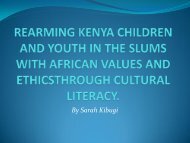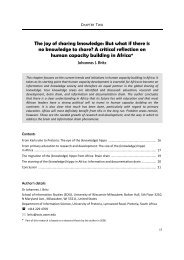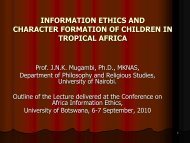<strong>Information</strong> <strong>Ethics</strong> <strong>in</strong> the <strong>Africa</strong>n Context• Corporate governance (through the attitudes of fairness, collectiveness, humility)• Restorative justice (through the use of dialogue, collective restitution and heal<strong>in</strong>g)• Conflict resolution and reconciliation (through the Ubuntu ethos of the Truth andReconciliation Commission, TRC) (Ol<strong>in</strong>ger et al., 2005:295)The authors emphasise the specificity of the ubuntu worldview as a community-based m<strong>in</strong>dset,opposed to Western libertarianism and <strong>in</strong>dividualism but close to communitarianism. For more on thistopic, the Nigerian philosopher Simeon Onyewueke Eboh has written a profound study on <strong>Africa</strong>nCommunalism (Eboh, 2004). Ol<strong>in</strong>ger, Britz and Olivier critically remark that the population of Southern<strong>Africa</strong> has to rediscover ubuntu because many have not experienced it, and also because many live<strong>in</strong> two different cultures – practis<strong>in</strong>g ubuntu <strong>in</strong> the rural environments and Western values <strong>in</strong> the urbanenvironments. If this is the case not only <strong>in</strong> South <strong>Africa</strong>, but <strong>in</strong> other <strong>Africa</strong>n countries, then there is agreat deal of theoretical and practical work to be done. The authors translate the aphorism ‘Umuntoungumuntu ngabanye abantu’ (Nguni languages of Zulu and Xhosa) as ‘A person is a person throughother persons’ (Ol<strong>in</strong>ger et al., 2005:293). Accord<strong>in</strong>g to Broodryk (2002), ubuntu is an <strong>Africa</strong>nworldview “based on values of <strong>in</strong>tense humanness, car<strong>in</strong>g, respect, compassion, and associatedvalues ensur<strong>in</strong>g a happy and qualitative human community life <strong>in</strong> a spirit of family”. This means thatpersonal privacy – be<strong>in</strong>g a key ethical value <strong>in</strong> Western countries – might be considered as lessimportant from an ubuntu-based perspective, even if we accept that there are several conceptions ofprivacy <strong>in</strong> both the West and the East (Capurro, Eldred & Nagel, 2013; Buchmann, 2012; Ess, 2005;Capurro, 2005). In a comparative study of ethical theories <strong>in</strong> different cultures, Michael Branniganaddresses <strong>Africa</strong>n ethics with the utterance “To Be is to Belong” (Brannigan, 2005). An analysis of thisthesis could lead to a foundation of <strong>Africa</strong>n <strong>Information</strong> <strong>Ethics</strong> based not upon the abstract ormetaphysical concept of ‘Be<strong>in</strong>g’ of some classical Western ethical theories, but upon the experienceof ‘Be<strong>in</strong>g’ as communal existence. The task of such an analysis would be to recognise the uniquenessof <strong>Africa</strong>n perspectives, as well as commonalities with other cultures and their theoretical expressions.This analysis could lead to an <strong>in</strong>terpretation of ICT with<strong>in</strong> an <strong>Africa</strong>n context and, correspond<strong>in</strong>gly, topossible vistas for <strong>in</strong>formation policy makers, responsible community leaders and, of course, for<strong>Africa</strong>n <strong>in</strong>stitutions.Johannes Britz chaired a session on ICTs <strong>in</strong> <strong>Africa</strong> at the <strong>Ethics</strong> and Electronic <strong>Information</strong> <strong>in</strong>the Twenty-First Century (EE21) symposium at the University of Memphis (Mend<strong>in</strong>a & Britz, 2004).He said that an important condition of <strong>Africa</strong>’s f<strong>in</strong>d<strong>in</strong>g a place <strong>in</strong> the 21 st century is a well-developedand ma<strong>in</strong>ta<strong>in</strong>ed ICT <strong>in</strong>frastructure. Britz and Peter Lor, former Chief Executive of the National Libraryof South <strong>Africa</strong>, believe that the present North-South flow of <strong>in</strong>formation should be complemented bya south-north flow <strong>in</strong> order to enhance mutual understand<strong>in</strong>g. They plead for a shift toward therecognition of the ‘local’ with<strong>in</strong> the ‘global’, follow<strong>in</strong>g the idea of ‘th<strong>in</strong>k<strong>in</strong>g locally and act<strong>in</strong>g globally’. Inethical terms, this means respect for different local cultures and strengthen<strong>in</strong>g their activeparticipation <strong>in</strong> <strong>in</strong>tercultural dialogue (Lor & Britz, 2004:18; Britz, 2004). Although <strong>Africa</strong> is still far froma true knowledge society, there is hope of success on certa<strong>in</strong> fronts, such as <strong>in</strong>vestment <strong>in</strong> humancapital, stemm<strong>in</strong>g the flight of <strong>in</strong>tellectual expertise, and the effective development and ma<strong>in</strong>tenanceof IT <strong>in</strong>frastructure (Britz et al., 2006). Dick Kawooya (Uganda Library Association) stresses theethical dilemma confront<strong>in</strong>g librarians and <strong>in</strong>formation professionals <strong>in</strong> much of sub-Saharan <strong>Africa</strong>,namely concerns about general literacy, <strong>in</strong>formation literacy and access to the Internet on the onehand, and ‘dw<strong>in</strong>dl<strong>in</strong>g budgets’ for educational <strong>in</strong>stitutions, particularly libraries, on the other (Kawooya,2004:34). Michael Anyiam-Osigwe, chief executive of the <strong>Africa</strong>n Institute for Leadership, Researchand Development, stresses the importance of ICT towards atta<strong>in</strong><strong>in</strong>g susta<strong>in</strong>able democracy <strong>in</strong> <strong>Africa</strong>(Anyiam-Osigwe, 2004). Accord<strong>in</strong>g to Coetzee Bester, a former member of parliament <strong>in</strong> South <strong>Africa</strong>and co-founder of the <strong>Africa</strong>n Institute for Leadership, Research and Development, the problem ofPage 15
R. CapurroICT <strong>in</strong> <strong>Africa</strong> <strong>in</strong>cludes all stakeholders. He writes:A program to reconstruct communities as holistic entities is necessary. This should <strong>in</strong>cludeleadership, followers, agreed-upon pr<strong>in</strong>ciples and values as well as effective <strong>in</strong>teractionamong all these elements (Bester, 2004:12).A value-based reorientation implies personal awareness, an understand<strong>in</strong>g of <strong>in</strong>formation, effective<strong>in</strong>teractions between leaders and their communities without limitations of time and space, and mutualconfidence <strong>in</strong> representative leadership.In the study <strong>Ethics</strong> and the Internet <strong>in</strong> West <strong>Africa</strong> (Brunet et al., 2004), the authors identify sixtypes of ethical issues related to the development of the Internet <strong>in</strong> <strong>Africa</strong> but also relevant for othercountries:• Exclusion and <strong>in</strong>equity• Culture (Internet content)• Internet costs and f<strong>in</strong>anc<strong>in</strong>g• Sociotechnical aspects of Internet <strong>in</strong>tegration (resistance, uses)• Political power• Economic organisationThere is no such th<strong>in</strong>g as a morally neutral technology. This is not to say that technologies can beused and misused, but to express the deeper <strong>in</strong>sight that all technologies create new ways of be<strong>in</strong>g.They <strong>in</strong>fluence our relation with one another, and they shape, <strong>in</strong> a more or less radical way, our<strong>in</strong>stitutions, our economies, and our moral values. This is why we should focus on <strong>in</strong>formationtechnology primarily from an ethical perspective. It is up to the <strong>Africa</strong>n people and their leaders toquestion how to transform their lives by these technologies. <strong>Africa</strong>n educational and research<strong>in</strong>stitutions should also critically reflect on these issues. As Bob Jolliffe, senior lecturer <strong>in</strong> computerscience at the University of South <strong>Africa</strong>, has po<strong>in</strong>ted out, there is an implicit connection between freesoftware, free culture, free science, open access, and the South <strong>Africa</strong>n Freedom Charter (Jolliffe,2006). A major task of <strong>Information</strong> <strong>Ethics</strong> is to align such ideals with concrete social, political,economic and technical processes. ICT <strong>in</strong> <strong>Africa</strong> should become a major contribution for open<strong>in</strong>g “thedoors of learn<strong>in</strong>g and culture”, to use the word<strong>in</strong>g of the South <strong>Africa</strong>n Freedom Charter. The space ofknowledge as a space of freedom is not, as Jollife rightly remarks, an abstract ideal. It has a historythat limits its possibilities. It is a space of rules and traditions of specific societies that is <strong>in</strong> dialoguewith their foundational myths and utopian aspirations. We are morally responsible not only for ourdeeds, but also for our dreams. <strong>Information</strong> <strong>Ethics</strong> offers an open space to retrieve and debate these<strong>in</strong>formation and communication myths and utopias.10. ProspectsThe ma<strong>in</strong> moral responsibility of <strong>Africa</strong>n academics is to enrich <strong>Africa</strong>n identities by retriev<strong>in</strong>g and recreat<strong>in</strong>g<strong>Africa</strong>n <strong>in</strong>formation and communication traditions. From this perspective, cultural memory isan ethical task if we want to create a humane community based not just on the number of people, buton the relations between them, as the German Egyptologist Jan Assmann remarks follow<strong>in</strong>g FriedrichNietzsche <strong>in</strong> his Genealogy of Morals (Assmann, 2000; Nietzsche, 1999:294-300). Cultural memorymust be re-shaped aga<strong>in</strong> and aga<strong>in</strong> to build the core of a humane society. This means no more andno less than bas<strong>in</strong>g morality on memory and communication, thereby establish<strong>in</strong>g <strong>Information</strong> <strong>Ethics</strong>at its core. The function of cultural memory is not just to express what belongs to the collectivememory of a community, but to engage the will of its members to connect themselves through thetask of creat<strong>in</strong>g it. Cultural memory is connective, therefore it is related to our myths and to ourdreams. We remember Nietzsche’s ambiguous warn<strong>in</strong>g: “You want to be responsible for everyth<strong>in</strong>g!But not for your dreams!” (Nietzsche, 1999a:117). I call this warn<strong>in</strong>g ‘ambiguous’ because Nietzsche,Page 16
- Page 1 and 2: Information Ethics in Africa: Cross
- Page 4: Information Ethics in Africa:Cross-
- Page 7 and 8: Page ii
- Page 9 and 10: Page iv
- Page 11 and 12: About the AuthorsDennis N. Ocholla
- Page 13 and 14: J.J. Britzmeaning of the ethical co
- Page 15 and 16: J.J. Britzright is not only on the
- Page 17 and 18: J.J. BritzFreeman, C. & Louca, F. (
- Page 19 and 20: R. Capurroprotection should be acco
- Page 21 and 22: R. Capurroindustrial and military a
- Page 23 and 24: R. Capurrocommon world instead of m
- Page 25: R. Capurroterminology (Wiredu, 1995
- Page 29 and 30: R. CapurroBuchmann, J. (Ed.) (2012)
- Page 31 and 32: R. CapurroRoosevelt, E. (1958). In
- Page 33 and 34: D.N. Ochollatheoretical views on th
- Page 35 and 36: D.N. Ochollaof GDP per capita are (
- Page 37 and 38: D.N. Ochollaassociate IK with tradi
- Page 39 and 40: D.N. Ochollafulfil the ideals as sp
- Page 41 and 42: S.M. MutulaBy definition, Informati
- Page 43 and 44: S.M. Mutulasurpassing countries in
- Page 45 and 46: S.M. MutulaThe University of Manito
- Page 47 and 48: S.M. Mutula8. Gaps in social media
- Page 49 and 50: S.M. Mutulaadhering to policies and
- Page 51 and 52: S.M. MutulaIt was found that cultur
- Page 53 and 54: S.M. MutulaVelasquez, M., Andre, C.
- Page 55 and 56: D. KawooyaLikewise, the laws and re
- Page 57 and 58: D. Kawooya107) but slowly making it
- Page 59 and 60: D. Kawooya4. IP in Africa and ethic
- Page 61 and 62: D. Kawooyawrongdoing because of the
- Page 63 and 64: D. Kawooyapractices. Countries that
- Page 65 and 66: D. KawooyaOf course, at the core of
- Page 67 and 68: D. Kawooyanumber of information acc
- Page 69 and 70: Page 58
- Page 71 and 72: S.M. Mutulaparties and civil societ
- Page 73 and 74: S.M. Mutulaadoption of the principl
- Page 75 and 76: S.M. Mutulaset of 17 barriers for e
- Page 77 and 78:
S.M. Mutulaavailing tender document
- Page 79 and 80:
S.M. MutulaReferencesAkther, M.S.,
- Page 81 and 82:
Page 70
- Page 83 and 84:
J.J. Britzalso to benefit from it t
- Page 85 and 86:
J.J. Britzthe public sphere, which
- Page 87 and 88:
J.J. Britzinfrastructure, developme
- Page 89 and 90:
J.J. Britz6.2. Qualitative indicato
- Page 91 and 92:
J.J. BritzSen, A. (1993). Capabilit
- Page 93 and 94:
IndexCapurro 1, 3, 4, 7, 11, 12, 21
- Page 95 and 96:
IndexFFacebook 30, 33fairness 2femi
- Page 97 and 98:
IndexITU World Telecommunication 27
- Page 99 and 100:
Indexrecognition algorithms 11recon
- Page 101:
IndexYYoruba 49YouTube 30ZZimbabwe






